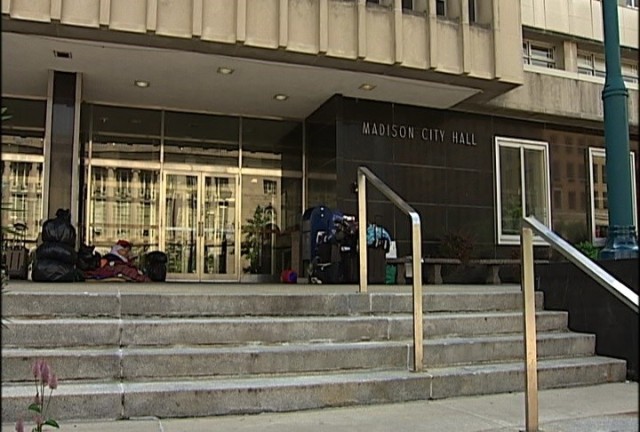Earlier this week, the City-County Liaison Committee voted 7-1 in support of a new policy that will result in loitering tickets being given to individuals who are in the City County Building or on the grounds of the building during non-business hours. Those tickets come with $400 trespassing fine. Given that the measure was clearly directed at forcing our homeless brothers and sisters who sleep there for the relative safety of a public and lit space off of the property, it seemed an unusually harsh and cruel action.
After over three hours of testimony, in which two people (one representing AFSCME) testified in support of the rules and dozens against, the mayor’s representative moved approval of the measure. County Executive Joe Parisi’s representative seconded the motion. During discussion it was suggested that while there were many compelling stories from the people who are homeless, their stories did not include the “back story” of the situation, thereby dismissing and diminishing the life experiences of the men and women who testified. The same “back story” remark was not made in reference to the testimony of those in support of the rule.
Those speaking in support of this rule change stated that people who work in the City County Building should be safe. Indeed, they should and the behaviors that were cited as problematic are already illegal. One committee member suggested that those who said they support enforcement of existing rules but opposed the new loitering rule were inconsistent. That’s one way to look at it. Many opposing the measure saw it differently. There is no legal place left for people who cannot access an overburdened shelter system to go (there are only 30 women’s shelter beds and only 21 shelter beds for families. On Sept. 1, the Salvation Army reported that 80 people had requested shelter in the family shelter on Aug. 31). The new rule forces people into isolation where they are more vulnerable. I don’t want to think that this is related to the Judge Doyle Square project, that we’re trying to push our homeless brothers and sisters back into the shadows so as not to offend the delicate sensibilities of developers or tourists, but the thought has crossed my mind.
The governor alleged that many of the Act 10 protestors were outside agitators. The mayor’s claim that many of the homeless in Madison are drifters reminds me of the governor’s attempts to discount the significance of the numbers. Such claims also remind me of what Dr. Martin Luther King Jr. wrote in his Letter from Birmingham Jail, “whatever effects one directly, affects all indirectly. Never again can we afford to live with the narrow, provincial ‘outside agitator’ idea. Anyone who lives inside the United States can never be considered an outsider anywhere within its bounds. You deplore the demonstrations taking place in Birmingham. But your statement, I am sorry to say, fails to express a similar concern for the conditions that brought about the demonstrations. I am sure that none of you would want to rest content with the superficial kind of social analysis that deals merely with effects and does not grapple with underlying causes.”
The new policy significantly penalizes homeless men, women, and children with fines too high for them to pay … leading to jail time when they cannot pay them. I asked the sheriff if passage of the measure would increase the jail population, he said “yes.” Ironic, given the County workgroups currently focused on ways to reduce the racial disparities in our criminal justice system.
What will happen when people are ticketed for trespassing? Their case will be entered on CCAP making it more difficult to find housing. What will happen when they can’t pay their fine and a warrant is issued? We know that a disproportionate number of men and women who are homeless in our community are black. We know that the arrest and incarceration disparities are real and this committee has created a new entrée into that system. Where was the Equity Statement?
During their discussion, committee members admitted that the City and County had failed: there’s still no day center, there’s no expanded storage, laundry or shower facilities for people who are homeless, yet they voted for it. By their own admission, committee members said that they were not voting on solutions, they were voting on policies that would punish the men and women who were sitting in the hearing room, people who seek out the relative safety of that building as they struggle to survive in a county that has inadequately funded mental health and AODA services. They struggle to survive in a City and County where development has focused on tax breaks for developers while the availability of truly affordable housing decreased (a recent UW study found that we need to develop 1,000 units of affordable housing per year for each of the next 20 years to catch up to the need).
Time and time again those voting in support of this measure failed to engage in a conversation about any of the solutions offered during testimony. Instead they chose the “superficial kind of social analysis” rather than “grapple with the underlying causes,” justifying their actions by saying that they only had authority over the block that is, as one committee member put it, “their kingdom.”




























